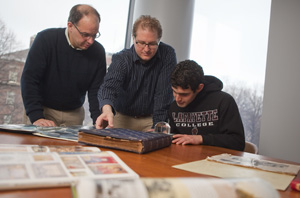Notice of Online Archive
This page is no longer being updated and remains online for informational and historical purposes only. The information is accurate as of the last page update.
For questions about page contents, contact the Communications Division.
Emanuel Santa-Donato ’10 writes about using his skills in Japanese to translate slides depicting the Japanese colonization of Taiwan under the guidance of Paul Barclay, associate professor of history
 Marquis Scholar Emanuel Santa-Donato ’10 (Yorktown Heights, N.Y.), a double major in economics and business and an individualized, interdisciplinary major in modern Japanese studies, is working on EXCEL research with Paul Barclay, associate professor of history, focusing on creating a searchable archive of postcards and photographs depicting the Japanese colonization of Taiwan.
Marquis Scholar Emanuel Santa-Donato ’10 (Yorktown Heights, N.Y.), a double major in economics and business and an individualized, interdisciplinary major in modern Japanese studies, is working on EXCEL research with Paul Barclay, associate professor of history, focusing on creating a searchable archive of postcards and photographs depicting the Japanese colonization of Taiwan.During the fall 2009 semester, I began working as an EXCEL scholar with Professor Barclay on the digitalization of postcards and slides depicting the Japanese colonization of Taiwan. The project’s ultimate objective is to create a user-friendly, searchable archive of these slides for use by the global academic community. Many of these slides contain Japanese text, and my main objective is the translation from Japanese to English. Two years ago, I was in a less direct role, scanning slides into the database as a part-time job on campus. Since I spent my junior year abroad in Tokyo, Japan, and have become much more comfortable with the language, I was able to take on more responsibility this year as an EXCEL scholar.
This was my first time using Japanese on a project outside of Japanese language class. Moving away from textbooks to a primary source was a big step, and in a way validates the year I spent abroad. Leaving the program, I was most worried about losing proficiency in a language I had worked so hard to maintain. Japanese has absolutely no resemblance to English in grammar, syntax, or lettering, so I knew that immersion was the only way to gain an advanced proficiency. This EXCEL scholarship lets me maintain a connection to the language, and my reading skills have in fact greatly improved since I began my work.
The work does have its challenges; I was pretty frustrated at the start. I had no idea the language had changed so much from the early 20th century. I can more or less read a Japanese newspaper without the aid of a dictionary, but in order to get through one of these slides, I need a three-inch thick comprehensive listing of the thousands of Japanese characters, many of which are no longer used in the modern language. Beyond the lettering, the grammar in these slides is much different than anything I had been exposed to previously. Even as late as the 1920s, Japanese were still writing in a style called bungo or “classical” Japanese, which was much different than the current form of the language. Gaining awareness and some experience in bungo has been the largest benefit of this project and makes me a better student of the Japanese language.
Professor Barclay has been an excellent mentor throughout this project. Not only has he learned the language, but he also has a comprehensive knowledge of Japan that I doubt few non-Japanese historians can match. Whenever I have trouble translating a place name, figurehead of a narrowly practiced Buddhist sect, or Taiwanese agricultural method, I know I can draw on his knowledge to get me started in the right direction. My work as an EXCEL Scholar has been a rewarding experience and I know that this digitization project will contribute long term to further my knowledge of Japanese history.
 Marquis Scholar Emanuel Santa-Donato ’10 (Yorktown Heights, N.Y.), a double major in economics and business and an individualized, interdisciplinary major in modern Japanese studies, is working on EXCEL research with Paul Barclay, associate professor of history, focusing on creating a searchable archive of postcards and photographs depicting the Japanese colonization of Taiwan.
Marquis Scholar Emanuel Santa-Donato ’10 (Yorktown Heights, N.Y.), a double major in economics and business and an individualized, interdisciplinary major in modern Japanese studies, is working on EXCEL research with Paul Barclay, associate professor of history, focusing on creating a searchable archive of postcards and photographs depicting the Japanese colonization of Taiwan.